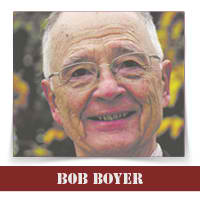
By: Bob Boyer
“Please call me ‘Butch’—it’s ugly but I’m stuck with it.” Butch made this request in one of our earliest exchanges of letters, in 1992, thereby introducing me to the cultural mysteries of Filipino nicknames. I had been debating what to call him when (or if) we became first-name correspondents. In typical fashion he sensitively relieved me of my dilemma. We quickly became pen-pals and then close friends and colleagues over the decades. I had first contacted Butch, through a mutual friend, for advice on a course I was developing in the Postcolonial Novel. My acquaintance with the Philippines was sketchy, but I had always been interested in this distant, former US colony. And I wanted a Filipino mentor. Butch graciously accepted the role.
Butch has recently retired; I would like to congratulate him on his distinguished career and thank him for being my friend and mentor. Butch’s list of publications and awards in a variety of genres—fiction, poetry, and plays in English and screenplays in English and Tagalog—is too lengthy to do it justice here. He deserves at least an epistle, but I will try to manage instead in a column of mostly personal reminiscences.
Butch served as Professor of English and Comparative Literature, Associate and past Director of the Creative Writing Center, and most recently a second term as University Vice President for Public Relations, all at the University of the Philippines Manila. His service as VP put him on a par with national government officials, entitling him to a personal car and driver. I was a direct beneficiary of his status when I had the use of the car and driver to explore Manila in 2004 (Butch’s first tour as VP) as preparation for writing a book. Butch’s presence was needed during some government hearing that might touch on issues involving the university. He sat for hours, during what I imagined were endless deliberations. His driver seemed happy exploring with me.
I knew from his method of mentoring that Butch was a successful teacher. He was not about to tell me which authors I should know. Instead he talked about a range of Filipinos writing in English and expected me to decide who was best for my purposes. This show-but-not-tell method contributed to Butch’s success as a teacher, university administrator, and journalist. About a year ago, I sent him a question about the “Bangsamoro Treaty” (now Law). In his reply, instead of giving me his answer, he went through the multi-page Treaty and cited and copied out the pertinent passages for me to digest. Butch plans to continue his newspaper articles; I plan to keep sending questions.
I have also tried to emulate Butch’s lucid and pleasant writing style and perhaps most importantly his succinctness in his newspaper articles over many years, currently for “The Philippine Star.” About two years into our correspondence, I asked Butch if he could meet with a delegation of educators who were coming to Manila (I was one). He answered a strong yes, but with a caveat: “Be forewarned though . . . that I tend to have a distinctly non-academic style, as jargon-free as possible—a surefire MLA reject.” MLA (Modern Language Association) is a prominent international academic association and journal. I fear that I too often fail to achieve his succinctness.
Filipino culture centers on family. The day after I first met Butch in person in Manila, I met Butch’s wife, June (‘Beng’) Poticar Dalisay, clearly Butch’s inspiration and best friend. Together they gave me a memorable tour of Intramuros, the old walled city, including an excellent lunch at a wonderful restaurant called Ilustrado.
At some time during the day, I had learned from Butch and Beng that they first met as student activists at UP Manila, opposed to the Marcos Martial Law. Butch claimed that his activism started when he heard Beng, a student leader, give a speech. Ironically Butch was the one who later spent over six months in martial law prison. By the end of that pleasurable day, however, I was puzzled. There seemed to be a disconnect between Butch and Beng’s activism and protesting versus their pride in the colonial heritage. ‘Ilustrado,’ after all is Spanish for ‘Elite,’ meaning the imperialists or their Filipino supporters. I later realized that a couple of factors were in play. One is that Filipinos tend to be pragmatic and accepting; the other is that that my mentors were, once again, providing the evidence rather than the conclusions. Filipinos raise questions about imperialism, keenly conscious of doing so in the language of the imperialists.
In two memorable actions just three months before retiring as Vice President for Public Affairs at UP Manila, Butch gave a speech at the University (October 24, 2018), “The Freedom of Intelligence,” and followed that two days later by giving a lengthy TV interview on the subject. Both actions were in response to recent allegations by the military and the National Police that the University was “brainwashing” the students and encouraging protests against the current government. In the speech and interview Butch brilliantly traced the history of UP Manila as a place of reasoned critical thinking. Allegations and threats against the university have subsided. Quite a legacy.
Bob Boyer welcomes your comments at robert.boyer@snc.edu.
 VIA Times – May 2019 Issue Vital News, Vibrant VIews for Asian Americans in Chicago & Midwest
VIA Times – May 2019 Issue Vital News, Vibrant VIews for Asian Americans in Chicago & Midwest

